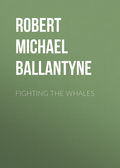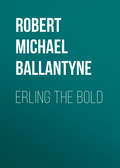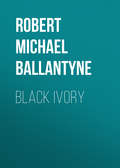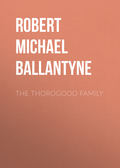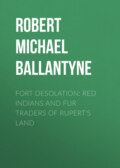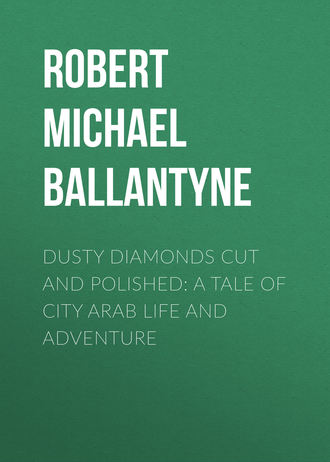
Robert Michael Ballantyne
Dusty Diamonds Cut and Polished: A Tale of City Arab Life and Adventure
“My dear child,” interrupted her amazed father, “you are talking nonsense. And—do keep a little further from the bed. There may be—you know—infection—”
“Oh! you needn’t fear infection here, sir,” said Mrs Frog, somewhat sharply. “We are poor enough, God knows, though I have seen better times, but we keep ourselves pretty clean, though we can’t afford to spend much on soap when food is so dear, and money so scarce—so very scarce!”
“Forgive me, my good woman,” said Sir Richard, hastily, “I did not mean to offend, but circumstances would seem to favour the idea—of—of—”
And here Wealth—although a bank director and chairman of several boards, and capable of making a neat, if weakly, speech on economic laws and the currency when occasion required—was dumb before Poverty. Indeed, though he had often theorised about that stricken creature, he had never before fairly hunted her down, run her into her den, and fairly looked her in the face.
“The fact is, Mrs Frog,” said Giles Scott, coming to the rescue, “Sir Richard is anxious to know something about your affairs—your family, you know, and your means of—by the way, where is baby?” he said looking round the room.
“She’s gone lost,” said Mrs Frog.
“Lost?” repeated Giles, with a significant look.
“Ay, lost,” repeated Mrs Frog, with a look of equal significance.
“Bless me, how did you lose your child?” asked Sir Richard, in some surprise.
“Oh! sir, that often happens to us poor folk. We’re used to it,” said Mrs Frog, in a half bantering half bitter tone.
Sir Richard suddenly called to mind the fact—which had not before impressed him, though he had read and commented on it—that 11,835 children under ten years of age had been lost that year, (and it was no exceptional year, as police reports will show), in the streets of London, and that 23 of these children were never found.
He now beheld, as he imagined, one of the losers of the lost ones, and felt stricken.
“Well now,” said Giles to Mrs Frog, “let’s hear how you get along. What does your husband do?”
“He mostly does nothin’ but drink. Sometimes he sells little birds; sometimes he sells penny watches or boot-laces in Cheapside, an’ turns in a little that way, but it all goes to the grog-shop; none of it comes here. Then he has a mill now an’ again—”
“A mill?” said Sir Richard,—“is it a snuff or flour—”
“He’s a professional pugilist,” explained Giles.
“An’ he’s employed at a music-hall,” continued Mrs Frog, “to call out the songs an’ keep order. An’ Bobby always used to pick a few coppers by runnin’ messages, sellin’ matches, and odd jobs. But he’s knocked over now.”
“And yourself. How do you add to the general fund?” asked Sir Richard, becoming interested in the household management of Poverty.
“Well, I char a bit an’ wash a bit, sir, when I’m well enough—which ain’t often. An’ sometimes I lights the Jews’ fires for ’em, an’ clean up their ’earths on Saturdays—w’ich is their Sundays, sir. But Hetty works like a horse. It’s she as keeps us from the work’us, sir. She’s got employment at a slop shop, and by workin’ ’ard all day manages to make about one shillin’ a week.”
“I beg your pardon—how much?”
“One shillin’, sir.”
“Ah, you mean one shilling a day, I suppose.”
“No, sir, I mean one shillin’ a week. Mr Scott there knows that I’m tellin’ what’s true.”
Giles nodded, and Sir Richard said, “ha–a–hem,” having nothing more lucid to remark on such an amazing financial problem as was here set before him.
“But,” continued Mrs Frog, “poor Hetty has had a sad disappointment this week—”
“Oh! mother,” interrupted Hetty, “don’t trouble the gentleman with that. Perhaps he wouldn’t understand it, for of course he hasn’t heard about all the outs and ins of slop-work.”
“Pardon me, my good girl,” said Sir Richard, “I have not, as you truly remark, studied the details of slop-work minutely, but my mind is not unaccustomed to financial matters. Pray let me hear about this—”
A savage growling, something between a mastiff and a man, outside the door, here interrupted the visitor, and a hand was heard fumbling about the latch. As the hand seemed to lack skill to open the door the foot considerately took the duty in hand and burst it open, whereupon the huge frame of Ned Frog stumbled into the room and fell prostrate at the feet of Sir Richard, who rose hastily and stepped back.
The pugilist sprang up, doubled his ever ready fists, and, glaring at the knight, asked savagely:
“Who the—”
He was checked in the utterance of a ferocious oath, for at that moment he encountered the grave eye of Number 666.
Relaxing his fists he thrust them into his coat-pockets, and, with a subdued air, staggered out of the house.
“My ’usband, sir,” said Mrs Frog, in answer to her visitor’s inquiring glance.
“Oh! is that his usual mode of returning home?”
“No, sir,” answered Bobby from his corner, for he was beginning to be amused by the succession of surprises which Wealth was receiving, “’e don’t always come in so. Sometimes ’e sends ’is ’ead first an’ the feet come afterwards. In any case the furniture’s apt to suffer, not to mention the in’abitants, but you’ve saved us to-night, sir, or, raither, Mr Scott ’as saved both us an’ you.”
Poor little Di, who had been terribly frightened, clung closer to her father’s arm on hearing this.
“Perhaps,” said Sir Richard, “it would be as well that we should go, in case Mr Frog should return.”
He was about to say good-bye when Di checked him, and, despite her fears, urged a short delay.
“We haven’t heard, you know, about the slops yet. Do stop just one minute, dear papa. I wonder if it’s like the beef-tea nurse makes for me when I’m ill.”
“It’s not that kind of slops, darling, but ready-made clothing to which reference is made. But you are right. Let us hear about it, Miss Hetty.”
The idea of “Miss” being applied to Hetty, and slops compared to beef-tea proved almost too much for the broken-legged boy in the corner, but he put strong constraint on himself and listened.
“Indeed, sir, I do not complain,” said Hetty, quite distressed at being thus forcibly dragged into notice. “I am thankful for what has been sent—indeed I am—only it was a great disappointment, particularly at this time, when we so much needed all we could make amongst us.”
She stopped and had difficulty in restraining tears. “Go on, Hetty,” said her mother, “and don’t be afraid. Bless you, he’s not goin’ to report what you say.”
“I know that, mother. Well, sir, this was the way on it. They sometimes—”
“Excuse me—who are ‘they’?”
“I beg pardon, sir, I—I’d rather not tell.”
“Very well. I respect your feelings, my girl. Some slop-making firm, I suppose. Go on.”
“Yes, sir. Well—they sometimes gives me extra work to do at home. It do come pretty hard on me after goin’ through the regular day’s work, from early mornin’ till night, but then, you see, it brings in a little more money—and, I’m strong, thank God.”
Sir Richard looked at Hetty’s thin and colourless though pretty face, and thought it possible that she might be stronger with advantage.
“Of late,” continued the girl, “I’ve bin havin’ extra work in this way, and last week I got twelve children’s ulsters to make up. This job when finished would bring me six and sixpence.”
“How much?”
“Six and sixpence, sir.”
“For the whole twelve?” asked Sir Richard.
“Yes, sir—that was sixpence halfpenny for makin’ up each ulster. It’s not much, sir.”
“No,” murmured Wealth in an absent manner; “sixpence halfpenny is not much.”
“But when I took them back,” continued Hetty—and here the tears became again obstreperous and difficult to restrain—“the master said he’d forgot to tell me that this order was for the colonies, that he had taken it at a very low price, and that he could only give me three shillin’s for the job. Of—of course three shillin’s is better the nothin’, but after workin’ hard for such a long long time an’ expectin’ six, it was—”
Here the tears refused to be pent up any longer, and the poor girl quietly bending forward hid her face in her hand.
“Come, I think we will go now,” said Sir Richard, rising hastily. “Good-night, Mrs Frog, I shall probably see you again—at least—you shall hear from me. Now, Di—say good-night to your boy.”
In a few minutes Sir Richard stood outside, taking in deep draughts of the comparatively fresher air of the court.
“The old screw,” growled Bobby, when the door was shut. “’E didn’t leave us so much as a single bob—not even a brown, though ’e pretends that six of ’em ain’t much.”
“Don’t be hard on him, Bobby,” said Hetty, drying her eyes; “he spoke very kind, you know, an’ p’raps he means to help us afterwards.”
“Spoke kind,” retorted the indignant boy; “I tell ’ee wot, Hetty, you’re far too soft an’ forgivin’. I s’pose that’s wot they teaches you in Sunday-school at George Yard—eh? Vill speakin’ kind feed us, vill it clothe us, vill it pay for our lodgin’s!”
The door opened at that moment, and Number 666 re-entered.
“The gentleman sent me back to give you this, Mrs Frog,” laying a sovereign on the rickety table. “He said he didn’t like to offer it to you himself for fear of hurting your feelings, but I told him he needn’t be afraid on that score! Was I right, Missis? Look well after it, now, an’ see that Ned don’t get his fingers on it.”
Giles left the room, and Mrs Frog, taking up the piece of gold, fondled it for some time in her thin fingers, as though she wished to make quite sure of its reality. Then wrapping it carefully in a piece of old newspaper, she thrust it into her bosom.
Bobby gazed at her in silence up to this point, and then turned his face to the wall. He did not speak, but we cannot say that he did not pray, for, mentally he said, “I beg your parding, old gen’l’m’n, an’ I on’y pray that a lot of fellers like you may come ’ere sometimes to ’urt our feelin’s in that vay!”
At that moment Hetty bent over the bed, and, softly kissing her brother’s dirty face, whispered, “Yes, Bobby, that’s what they teach me in Sunday-school at George Yard.”
Thereafter Wealth drove home in a cab, and Poverty went to bed in her rags.
Chapter Seven.
Bicycling and its Occasional Results
It is pleasant to turn from the smoke and turmoil of the city to the fresh air and quiet of the country.
To the man who spends most of his time in the heart of London, going into the country—even for a short distance—is like passing into the fields of Elysium. This was, at all events, the opinion of Stephen Welland; and Stephen must have been a good judge, for he tried the change frequently, being exceedingly fond of bicycling, and occasionally taking what he termed long spins on that remarkable instrument.
One morning, early in the summer-time, young Welland, (he was only eighteen), mounted his iron horse in the neighbourhood of Kensington, and glided away at a leisurely pace through the crowded streets. Arrived in the suburbs of London he got up steam, to use his own phrase, and went at a rapid pace until he met a “chum,” by appointment. This chum was also mounted on a bicycle, and was none other than our friend Samuel Twitter, Junior—known at home as Sammy, and by his companions as Sam.
“Isn’t it a glorious day, Sam?” said Welland as he rode up and sprang off his steed.
“Magnificent!” answered his friend, also dismounting and shaking hands. “Why, Stephen, what an enormous machine you ride!”
“Yes, it’s pretty high—48 inches. My legs are long, you see. Well, where are we to run to-day?”
“Wherever you like,” said Sam, “only let it be a short run, not more than forty miles, for I’ve got an appointment this afternoon with my old dad which I can’t get off.”
“That’ll do very well,” said Welland, “so we can go round by—”
Here he described a route by country road and village, which we pretend not to remember. It is sufficient to know that it represented the required “short” run of forty miles—such is the estimate of distance by the youth of the present day!
“Now then, off we go,” said Welland, giving his wheel—he quite ignored the existence of the little thing at the back—a shove, putting his left foot on the treadle, and flinging his right leg gracefully over.
Young Twitter followed suit, but Sammy was neither expert nor graceful. True, he could ride easily, and travel long distances, but he could only mount by means of the somewhat clumsy process of hopping behind for several yards.
Once up, however, he went swiftly enough alongside his tall companion, and the two friends thereafter kept abreast.
“Oh! isn’t it a charming sensation to have the cool air fanning one’s cheeks, and feel the soft tremor of the wheel, and see the trees and houses flow past at such a pace? It is the likest thing to flying I ever felt,” said Welland, as they descended a slight incline at, probably, fifteen miles an hour.
“It is delightful,” replied Sam, “but, I say, we better put on the brakes here a bit. It gets much steeper further down.”
Instead of applying the brake, however, young Welland, in the exuberance of his joy, threw his long legs over the handles, and went down the slope at railway speed, ready, as he remarked, for a jump if anything should go wrong.
Twitter was by no means as bold as his friend, but, being ashamed to show the white feather, he quietly threw his shorter legs over the handles, and thus the two, perched—from a fore-and-aft point of view—upon nothing, went in triumph to the bottom of the hill.
A long stretch of smooth level road now lay before them. It required the merest touch on the treadles to send them skimming along like skaters on smooth ice, or swallows flying low. Like gentle ghosts they fleeted along with little more than a muffled sound, for their axles turned in ball-sockets and their warning bells were silent save when touched.
Onward they went with untiring energy, mile after mile, passing everything on the way—pedestrians, equestrians, carts and gigs; driving over the level ground with easy force, taking the hills with a rush to keep up the pace, and descending on the other sides at what Welland styled a “lightning run.”
Now they were skimming along a road which skirted the margin of a canal, the one with hands in his coat-pockets, the other with his arms crossed, and both steering with their feet; now passing under a railway-arch, and giving a wild shout, partly to rouse the slumbering echoes that lodged there, and partly to rouse the spirit of a small dog which chanced to be passing under it—in both cases successfully! Anon they were gliding over a piece of exposed ground on which the sun beat with intense light, causing their shadows to race along with them. Again they were down in a hollow, gliding under a row of trees, where they shut off a little of the steam and removed their caps, the better to enjoy the grateful shade. Soon they were out in the sunshine again, the spokes of their wheels invisible as they topped a small eminence from the summit of which they took in one comprehensive view of undulating lands, with villages scattered all round, farm-houses here and there, green fields and flowering meadows, traversed by rivulet or canal, with cattle, sheep, and horses gazing at them in silent or startled wonder, and birds twittering welcome from the trees and hedge-rows everywhere.
Now they were crossing a bridge and nearing a small town where they had to put hands to the handles again and steer with precaution, for little dogs had a tendency to bolt out at them from unexpected corners, and poultry is prone to lose its heads and rush into the very jaws of danger, in a cackling effort to avoid it. Stray kittens and pigs, too, exhibited obstinate tendencies, and only gave in when it was nearly too late for repentance. Little children, also, became sources of danger, standing in the middle of roads until, perceiving a possible catastrophe, they dashed wildly aside—always to the very side on which the riders had resolved to pass,—and escaped by absolute miracle!
Presently they came to a steep hill. It was not steep enough to necessitate dismounting, but it rendered a rush inadvisable. They therefore worked up slowly, and, on gaining the top, got off to breathe and rest a while.
“That was a glorious run, wasn’t it, Sam?” said Welland, flicking the dust from his knees with his handkerchief. “What d’ye say to a glass of beer?”
“Can’t do it, Stephen, I’m Blue Ribbon.”
“Oh! nonsense. Why not do as I do—drink in moderation?”
“Well, I didn’t think much about it when I put it on,” said Sam, who was a very sensitive, and not very strong-minded youth; “the rest of us did it, you know, by father’s advice, and I joined because they did.”
Welland laughed rather sarcastically at this, but made no rejoinder, and Sam, who could not stand being laughed at, said—
“Well, come, I’ll go in for one glass. I’ll be my own doctor, and prescribe it medicinally! Besides, it’s an exceptional occasion this, for it is awfully hot.”
“It’s about the best run I ever had in the same space of time,” said Welland on quitting the beer shop.
“First-rate,” returned Sam, “I wish my old dad could ride with us. He would enjoy it so.”
“Couldn’t we bring him out on a horse? He could ride that, I suppose?”
“Never saw him on a horse but once,” said Sam, “and that time he fell off. But it’s worth suggesting to him.”
“Better if he got a tricycle,” said Welland.
“I don’t think that would do, for he’s too old for long rides, and too short-winded. Now, Stephen, I’m not going to run down this hill. We must take it easy, for it’s far too steep.”
“Nonsense, man, it’s nothing to speak of; see, I’ll go first and show you the way.”
He gave the treadle a thrust that sent him off like an arrow from a bow.
“Stay! there’s a caravan or something at the bottom—wild beasts’ show, I think! Stop! hold on!”
But Sam Twitter shouted in vain. Welland’s was a joyous spirit, apt to run away with him. He placed his legs over the handles for security, and allowed the machine to run. It gathered speed as it went, for the hill became steeper, insomuch that the rider once or twice felt the hind-wheel rise, and had to lean well back to keep it on the ground. The pace began to exceed even Welland’s idea of pleasure, but now it was too late to use the brake, for well did he know that on such a slope and going at such a pace the slightest check on the front wheel would send him over. He did not feel alarmed however, for he was now near the bottom of the hill, and half a minute more would send him in safety on the level road at the foot.
But just at the foot there was a sharpish turn in the road, and Welland looked at it earnestly. At an ordinary pace such a turn could have been easily taken, but at such a rate as he had by that time attained, he felt it would require a tremendous lean over to accomplish it. Still he lost no confidence, for he was an athlete by practice if not by profession, and he gathered up his energies for the moment of action.
The people of the caravan—whoever they were—had seen him coming, and, beginning to realise his danger to some extent, had hastily cleared the road to let him pass.
Welland considered the rate of speed; felt, rather than calculated, the angle of inclination; leaned over boldly until the tire almost slipped sideways on the road, and came rushing round with a magnificent sweep, when, horrible sight! a slight ridge of what is called road-metal crossed the entire road from side to side! A drain or water pipe had recently been repaired, and the new ridge had not yet been worn down by traffic. There was no time for thought or change of action. Another moment and the wheel was upon it, the crash came, and the rider went off with such force that he was shot well in advance of the machine, as it went with tremendous violence into the ditch. If Welland’s feet had been on the treadles he must have turned a complete somersault. As it was he alighted on his feet, but came to the ground with such force that he failed to save himself. One frantic effort he made and then went down headlong and rolled over on his back in a state of insensibility.
When Sam Twitter came to the bottom of the hill with the brake well applied he was able to check himself in time to escape the danger, and ran to where his friend lay.
For a few minutes the unfortunate youth lay as if he had been dead. Then his blood resumed its flow, and when the eyes opened he found Sam kneeling on one side of him with a smelling bottle which some lady had lent him, and a kindly-faced elderly man with an iron-grey beard kneeling on the other side and holding a cup of water to his lips.
“That’s right, Stephen, look up,” said Sam, who was terribly frightened, “you’re not much hurt, are you?”
“Hurt, old fellow, eh?” sighed Stephen, “why should I be hurt? Where am I? What has happened?”
“Take a sip, my young friend, it will revive you,” said the man with the kindly face. “You have had a narrow escape, but God has mercifully spared you. Try to move now; gently—we must see that no bones have been broken before allowing you to rise.”
By this time Welland had completely recovered, and was anxious to rise; all the more that a crowd of children surrounded him, among whom he observed several ladies and gentlemen, but he lay still until the kindly stranger had felt him all over and come to the conclusion that no serious damage had been done.
“Oh! I’m all right, thank you,” said the youth on rising, and affecting to move as though nothing had happened, but he was constrained to catch hold of the stranger rather suddenly, and sat down on the grass by the road-side.
“I do believe I’ve got a shake after all,” he said with a perplexed smile and sigh. “But,” he added, looking round with an attempt at gaiety, “I suspect my poor bicycle has got a worse shake. Do look after it, Sam, and see how it is.”
Twitter soon returned with a crestfallen expression. “It’s done for, Stephen. I’m sorry to say the whole concern seems to be mashed up into a kind of wire-fencing!”
“Is it past mending, Sam?”
“Past mending by any ordinary blacksmith, certainly. No one but the maker can doctor it, and I should think it would take him a fortnight at least.”
“What is to be done?” said Stephen, with some of his companion’s regret of tone. “What a fool I was to take such a hill—spoilt such a glorious day too—for you as well as myself, Sam. I’m very sorry, but that won’t mend matters.”
“Are you far from home, gentlemen?” asked the man with the iron-grey beard, who had listened to the conversation with a look of sympathy.
“Ay, much too far to walk,” said Welland. “D’you happen to know how far off the nearest railway station is?”
“Three miles,” answered the stranger, “and in your condition you are quite unfit to walk that distance.”
“I’m not so sure of that,” replied the youth, with a pitiful look. “I think I’m game for three miles, if I had nothing to carry but myself, but I can’t leave my bicycle in the ditch, you know!”
“Of course you can’t,” rejoined the stranger in a cheery tone, “and I think we can help you in this difficulty. I am a London City Missionary. My name is John Seaward. We have, as you see, brought out a number of our Sunday-school children, to give them a sight of God’s beautiful earth; poor things, they’ve been used to bricks, mortar, and stone all their lives hitherto. Now, if you choose to spend the remainder of the day with us, we will be happy to give you and the injured bicycle a place in our vans till we reach a cabstand or a railway station. What say you? It will give much pleasure to me and the teachers.”
Welland glanced at his friend. “You see, Sam, there’s no help for it, old boy. You’ll have to return alone.”
“Unless your friend will also join us,” said the missionary.
“You are very kind,” said Sam, “but I cannot stay, as I have an engagement which must be kept. Never mind, Stephen. I’ll just complete the trip alone, and comfort myself with the assurance that I leave you in good hands. So, good-bye, old boy.”
“Good-bye, Twitter,” said Stephen, grasping his friend’s hand.
“Twitter,” repeated the missionary, “I heard your friend call you Sam just now. Excuse my asking—are you related to Samuel Twitter of Twitter, Slime, and Company, in the city?”
“I’m his eldest son,” said Sam.
“Then I have much pleasure in making your acquaintance,” returned the other, extending his hand, “for although I have never met your father, I know your mother well. She is one of the best and most regular teachers in our Sunday-schools. Is she not, Hetty?” he said, turning to a sweet-faced girl who stood near him.
“Indeed she is, I was her pupil for some years, and now I teach one of her old classes,” replied the girl.
“I work in the neighbourhood of Whitechapel, sir,” continued the missionary, “and most of the children here attend the Institution in George Yard.”
“Well, I shall tell my mother of this unexpected meeting,” said Sam, as he remounted his bicycle. “Good-bye, Stephen. Don’t romp too much with the children!”
“Adieu, Sam, and don’t break your neck on the bicycle.”
In a few minutes Sam Twitter and his bicycle were out of sight.



